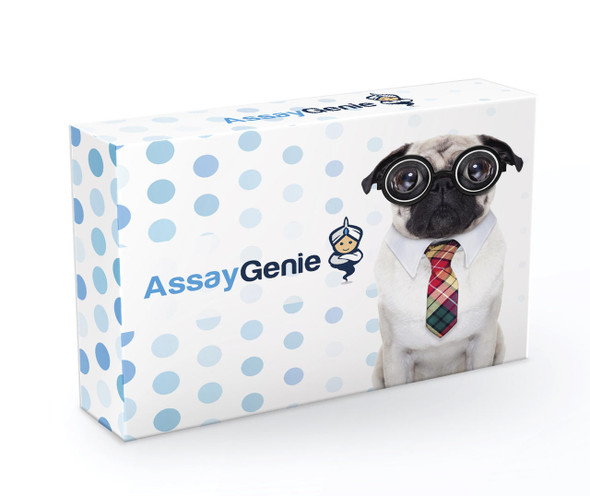Description
| Product Name: | Mouse Midkine Recombinant Protein |
| Product Code: | RPPB0773 |
| Size: | 20µg |
| Species: | Mouse |
| Target: | Midkine |
| Synonyms: | NEGF-2, Neurite Growth-Promoting Factor 2, MK, Neurite outgrowth-promoting protein, Midgestation and kidney protein, Amphiregulin-associated protein, ARAP, Neurite outgrowth-promoting factor 2, FLJ27379, Midkine, MK1, NEGF2. |
| Source: | Escherichia Coli |
| Physical Appearance: | Sterile Filtered White lyophilized (freeze-dried) powder. |
| Formulation: | Lyophilized from a 0.2um filtered concentrated solution in PBS, pH 7.4. |
| Solubility: | It is recommended to reconstitute the lyophilized Midkine Mouse in sterile 18M-cm H2O not less than 100�g/ml, which can then be further diluted to other aqueous solutions. |
| Stability: | Lyophilized Midkine Mouse although stable at room temperature for 3 weeks, should be stored desiccated below -18°C. Upon reconstitution Midkine Mouse should be stored at 4°C between 2-7 days and for future use below -18°C.Please prevent freeze-thaw cycles. |
| Purity: | Greater than 95.0% as determined by HPLC and SDS-PAGE. |
| Amino Acid Sequence: | VAKKKEKVKK GSECSEWTWG PCTPSSKDCG MGFREGTCGA QTQRVHCKVP CNWKKEFGAD CKYKFESWGA CDGSTGTKAR QGTLKKARYN AQCQETIRVT KPCTSKTKSK TKAKKGKGKD |
| Biological Activity: | Fully biologically active when compared to standard. Determined by its ability to chemoattract human neutrophils using a concentration range of 10-100 ng/ml corresponding to a specific activity of 10,000-100,000IU/mg. |
Midkine (MK) is the product of a retinoic acid responsive gene, MK, and is a member of a family of heparin binding factors. It contains 121 amino acid residues including 10 conserved cysteine residues, all of which appear to be disulphide linked.Midkine is expressed during embryogenesis, showing an expression pattern that suggests functions in neurogenesis, cell migration, secondary organogenetic induction, and mesoderm-epithelial interaction.The widespread downregulation of MK in the adult human is reverted in a number of cancers, in which polypeptides are able to act as both transforming growth factors and promoters of angiogenesis.Midkine (MK), induces chemotaxis of human neutrophils and was found to trigger mobilization of intracellular calcium of these cells.Midkine induces histamine release from rat peritoneal mast cells with a rapid response in a dose dependent manner.Midkine is also a potent stimulator of collagen and glycosaminoglycan synthesis.
Midkine Mouse Recombinant produced in E.Coli is a single, non-glycosylated, polypeptide chain containing 120 amino acids and having a molecular mass of 13.3kDa.The Midkine Mouse is purified by proprietary chromatographic techniques.
| UniProt Protein Function: | MDK: Developmentally regulated, secreted growth factor homologous to pleiotrophin (PTN), which has heparin binding activity. Binds anaplastic lymphoma kinase (ALK) which induces ALK activation and subsequent phosphorylation of the insulin receptor substrate (IRS1), followed by the activation of mitogen-activated protein kinase (MAPK) and PI3-kinase, and the induction of cell proliferation. Involved in neointima formation after arterial injury, possibly by mediating leukocyte recruitment. Also involved in early fetal adrenal gland development. Belongs to the pleiotrophin family. |
| UniProt Protein Details: | Protein type:Secreted; Secreted, signal peptide Cellular Component: cell projection; cytoplasm; extracellular region Molecular Function:heparin binding; growth factor activity Biological Process: cell migration; behavioral fear response; cerebellar granular layer development; adrenal gland development; short-term memory; multicellular organismal development; positive regulation of transcription, DNA-dependent; hippocampus development; positive regulation of cell division; response to wounding; negative regulation of neuron apoptosis; cell differentiation; defecation; regulation of behavior |
| NCBI Summary: | This gene encodes a secreted growth factor that belongs to the pleiotrophin/midkine heparin-binding protein family and functions in a variety of biological processes. The encoded cytokine promotes the growth, differentiation, survival and migration of several target cells including leucocytes involved in inflammation. This protein plays a role in the formation of scar tissue and intraperitoneal adhesions, and promotes neurite outgrowth and neuron survival. The protein encoded by this gene is associated with obesity and inhibition of insulin signaling in fat cells. A pseudogene of this gene is present on chromosome 11. Alternative splicing results in multiple transcript variants. [provided by RefSeq, Apr 2014] |
| UniProt Code: | P12025 |
| NCBI GenInfo Identifier: | 127117 |
| NCBI Gene ID: | 17242 |
| NCBI Accession: | P12025.2 |
| UniProt Related Accession: | P12025 |
| Molecular Weight: | 15,434 Da |
| NCBI Full Name: | Midkine |
| NCBI Synonym Full Names: | midkine |
| NCBI Official Symbol: | Mdk�� |
| NCBI Official Synonym Symbols: | MK; Mek�� |
| NCBI Protein Information: | midkine; retinoic acid-responsive protein; retinoic acid-induced differentiation factor |
| UniProt Protein Name: | Midkine |
| UniProt Synonym Protein Names: | Retinoic acid-induced differentiation factor |
| Protein Family: | Midkine |
| UniProt Gene Name: | Mdk�� |
| UniProt Entry Name: | MK_MOUSE |










